China arms Pakistan with steel. Turkey arms it with stealth — and a story to sell the world
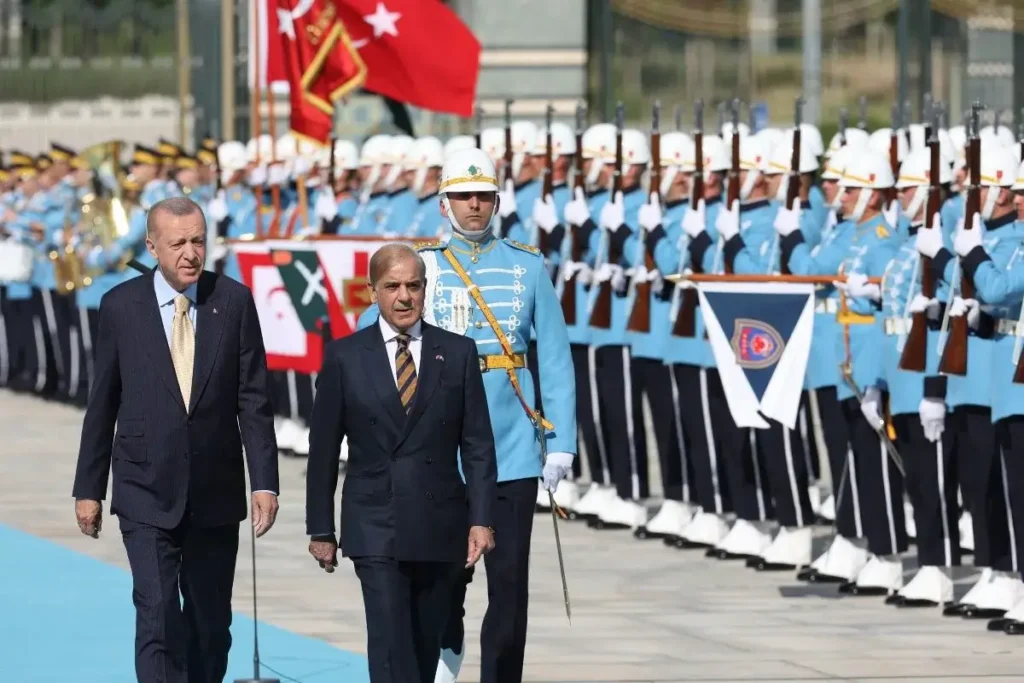
Turkey is Pakistan’s second biggest defence partner next to China. According to the SIPRI (Stockholm International Peace Research Institute) report published in March 2025, Turkey exports ten percent of the arms to Pakistan, which was the world’s fifth-largest arms importer in 2020–24. The US, once a big time arms seller, is no longer Pakistan’s Top 3 arms suppliers. No wonder Turkey and Azerbaijan were among the few nations in the world that supported Pakistan during Operation Sindoor, which targeted terrorist bases in Pakistan and Pakistan-occupied Kashmir (PoK).
In Operation Sindoor, Turkish drones were not game-changers, but they played a critical enabling role — enhancing Pakistan’s ability to surveil, respond, and contain damage. Their use marks a new chapter in Islamabad-Ankara defence ties, showing how Turkey is becoming Pakistan’s second-most important defence partner after China.
Turkey, in particular, has grown closer to Pakistan on both diplomatic and military fronts. Turkey provided the drones and military hardware to Pakistan which was used to attack Indian cities along the International Border and Line of Control.
Turkey was among the first to establish diplomatic ties with Pakistan in 1947. But in the past decade, especially under the leadership of Recep Tayyip Erdogan this friendship has blossomed into strategic military cooperation.
Turkey, often referred to as a “brotherly nation” by Pakistani leaders, reaffirmed its support to Pakistan after the terror attack on India on 22 April 2025.
Just hours after the Pahalgam attack in which at least 26 people were killed, Turkish President Erdogan met Pakistani Prime Minister Shehbaz Sharif and offered Turkey’s “unwavering support” on the Kashmir issue.
Turkey previously upgraded the avionics of Pakistan’s 42 F-16s. Turkey has supplied Pakistan with advanced weaponry, including four MILGEM-class corvettes — PNS Babur and PNS Khyber constructed in Istanbul, and PNS Badr and PNS Tariq to be built at the Karachi Shipyard.
In 2024, high-level Turkish delegations visited Pakistan to explore options to jointly develop beyond-visual range air-to-air missiles (BVRAAMs) like Turkey’s Gokdogan. Pakistan is a money-spinning customer for Turkey’s growing arms industry. Turkey sold MILGEM-class warships, drones, smart munitions, and radar systems to Pakistan.
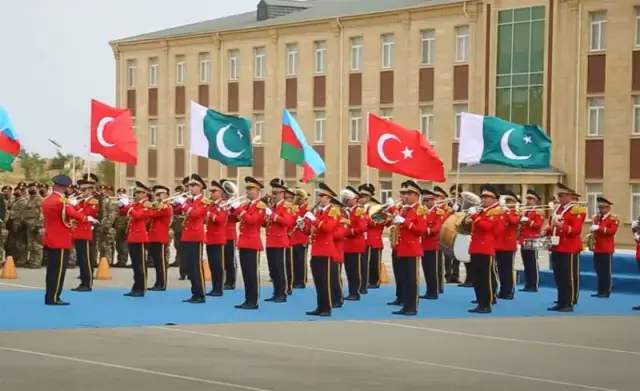
Turkey is modernizing Pakistan’s Agosta 90B known as Hashmat Class submarines in Pakistan Navy, building MILGEM-class corvettes, and providing technical support for shipyards in Karachi besides supplying electronic warfare suites, radars, communication gear, and cyber-defence systems, to help Pakistan upgrade its C4I (Command, Control, Communications, Computers, and Intelligence) infrastructure.
Turkey has established itself as a leading player in the global market for armed drones. The Turkish drone in Pakistan’s inventory include swarm drones, loitering munitions and cheap, high-impact UAVs designed to overwhelm radar systems, hunt mobile artillery and surveillance. Pakistan uses the Turkish Bayraktar TB2 and Akinci drones tested in battle-field conditions in Syria, Libya, and Nagorno-Karabakh. These drones offer Pakistan real-time surveillance, asymmetric strike capability, and intelligence gathering tools, especially along the India border.
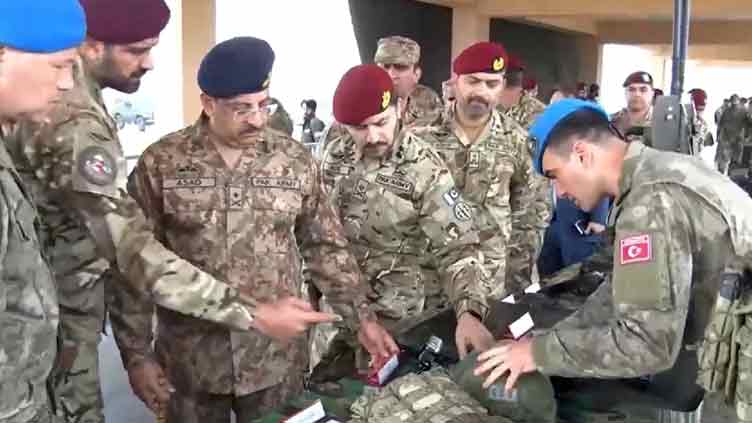
Some of the drones, loitering munitions, electronic warfare systems and military hardware supplied by Turkey to Pakistan include:
Byker YIHA III Kamikaze drones – loitering munitions known for their durability, ability to stay airborne for long periods, and agility in flight. They use electro-optical systems to locate and engage targets accurately.
Bayraktar TB2 drones – a medium-altitude long-endurance (MALE) unmanned combat aerial vehicle (UCAV) with a 24 hours flight time and an operational range of nearly 300 kilometers. The Bayraktar TB2 drones are ideally suited for intelligence gathering, surveillance, reconnaissance (ISR), and strike missions. TB2 can stay airborne for over 24 hours and reach or engage targets over a range of nearly 300 kilometers – deep inside enemy territory. Bayraktar TB2 drones were reportedly deployed for border surveillance, damage assessment, and possible target acquisition in regions near the Line of Control (LoC) and Punjab. The long-endurance capability of Turkish drones helped Pakistan track Indian air activity. These drones provided crucial situational awareness, especially when Pakistan’s own early warning systems were briefly disabled or jammed during the initial strike wave.
Akinci combat UAVs – a high-altitude, long-endurance unmanned combat aerial vehicle (UCAV) designed for both air-to-ground and air-to-air attack missions. The Pakistan Air Force has already been using 6-7 Akıncı UAVs delivered during the first half of 2023.
Aselsan Electronic Warfare /counter-drone jammers, and battlefield communications systems – Turkey has been supplying Aselsan Electronic Warfare systems and counter-drone jammers to Pakistan in recent years which played a crucial role during Operation Sindoor to jam or confuse Indian drones and missile guidance systems, and maintain secure battlefield communications in border regions during India’s multi-pronged assault. The Aselsan Koral EW system, in particular, is believed to have played a role in protecting Pakistani radar stations from being blinded by Indian Suppression of Enemy Air Defenses (SEAD) tactics.
Kargu loitering munitions – aTurkish kamikaze or suicide drone designed for asymmetric warfare. It’s a portable drone system that can be carried and operated by a single person. Kargu can be used against static or moving targets, utilizing real-time image processing and machine learning algorithms. It can be deployed in about a minute by a single soldier and has a low radar cross-sectional area makes it difficult to detect. It also has mission-abort, return-to-home, and self-destruct capabilities.
Ankara’s growing military alignment with Pakistan
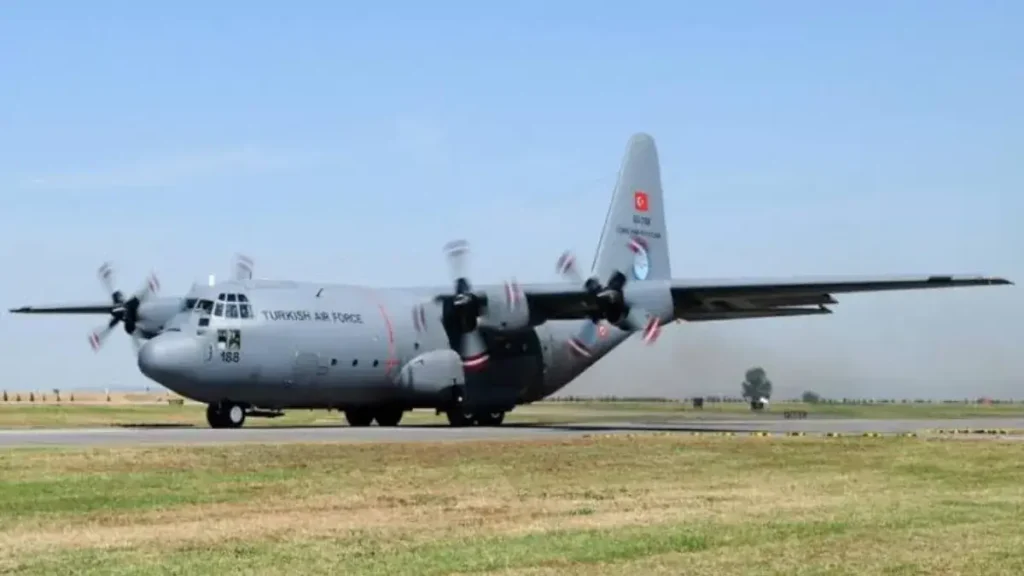
Six C-130 Hercules military transport aircraft landed in Pakistan as soon as reports suggested that Pakistan had just four days of ammunition left to fight a war. These aircraft can be used for rapid deployment of troops, and combat equipment. According to unconfirmed reports six more Turkish military planes arrived at a military airbase in Islamabad.
Meanwhile, TCG Bykada (F-512) – stealthy Turkish Navy corvette armed with anti-ship missiles, torpedoes, air defence systems and a helicopter deck for anti-submarine ops arrived at Karachi port on a “goodwill visit. The Turkish warship docked in Karachi a day after Turkish Ambassador Irfan Neziroglu met Prime Minister Shehbaz Sharif to express “Ankara’s solidarity with Pakistan”. Ankara however describes this as a routine port call.
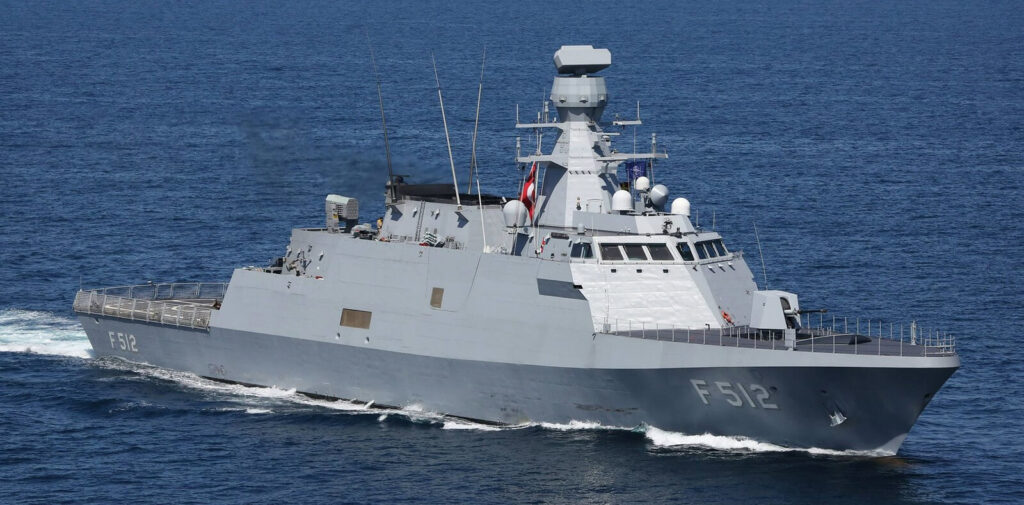
Turkish drones were being used to monitor Indian movement in Kashmir. A few days ago about 300-400 Turkish-origin drones tried to intrude into Indian Territory at 36 locations from Leh in Ladakh to Sir Creek in Gujarat but were shot down.
Preliminary forensic analysis of debris of the damaged drones suggests they were Turkish-made “Asisguard Songar” a low-altitude, quadrotor, unmanned combat aerial vehicle (UAEV) used by the Turkish Armed Forces. It has an operational range of approximately 10 km and is fitted with several types of built-in weapons that can remotely destroy targets. These are low-cost, easy to use, light weight drones can be carried by personnel in large numbers. Another advantage of these drones is that they can perform aerial reconnaissance of the target area or location, destroys the target, performs post-operative damage assessment, and transmits real-time images back to the operational control room.
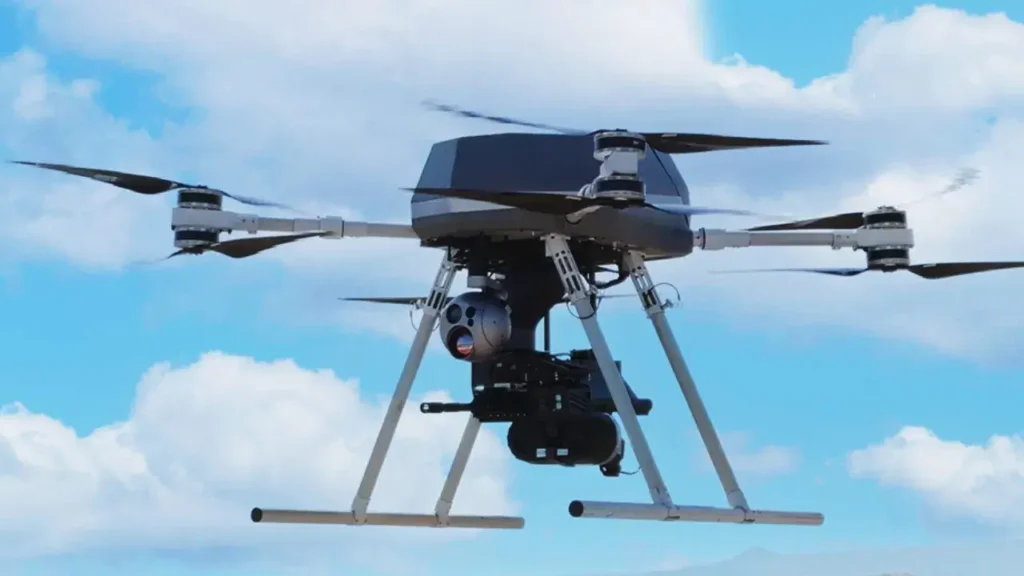
The presence of Turkish aircraft, and naval assets in Pakistan is a clear signal that Ankara is quietly but unmistakably stepping onto the battlefield as an active participant in the live operations or war against India. According to sources Turkey is not just arming Pakistan, but also shaping its battlefield capabilities. There is a possibility that Turkish trainers, and advisers are working behind the scene to boost Pakistan’s morale and assist in the operation like they did in Libya, Syria, and Azerbaijan. Turkish naval engineers upgrade Pakistan’s frigates, while Turkish military trainers shape Pakistan’s next generation of officers. Turkish military academies are training Pakistani cadets in drone warfare, and urban combat.
Turkey’s physical military presence in Pakistan — whether in the form of drones in the sky or warships in Karachi — is not just symbolic. Turkish training and joint drone command protocols helped the Pakistan Air Force (PAF) quickly mobilize and coordinate unmanned systems across multiple fronts.
The presence of Turkish-origin drones, aircraft, and warships in Pakistan — particularly during Operation Sindoor — has serious strategic implications and signals a new phase in the Turkey–Pakistan relations that is not just rhetorical or diplomatic but operational and combat-ready. The meaning is loud and clear – Turkey is no longer a neutral bystander —but an influencer and combat enabler.
There is also a possibility that Turkey may be using Pakistan as a live testing ground to test military systems under combat conditions — like it did in Libya and Nagorno-Karabakh. This would give Turkey valuable data and feedback on drone performance against Indian defences and real-time assessment of its naval and aerial platforms in South Asia’s high-tension environment.
What’s even more troubling is that Turkey may be rehearsing future wars using Pakistan’s conflict with India as an indirect battlefield lab for Turkey’s military-industrial complex. By observing the performance of its systems in South Asia’s high-threat environment — against India’s S-400s, electronic jamming systems, and air defences, Ankara can:
- Gather combat data to improve its drones and warfare tactics.
- Showcase its capabilities in the weapons market globally.
- Demonstrate Islamic military solidarity, reinforcing Erdogan’s vision of pan-Islamic leadership.
What does turkey gain by siding with Pakistan?
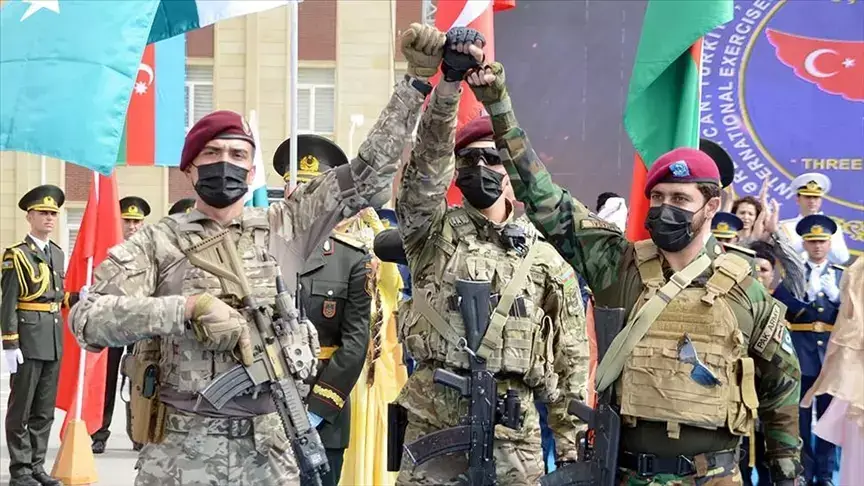
Turkey’s steadfast support for Pakistan isn’t because of brotherly love or Islamic solidarity but a thought out strategic move driven by Turkey’s geopolitical ambitions, economic interests, and power projection goals. Turkey gains economic leverage, military profits, ideological legitimacy, and geopolitical influence by siding with Pakistan. Here is what Turkey stands to gain:
- By siding with Pakistan, President Erdogan wants to emerge as the leader of the Muslim world like 2019 when Turkey, Pakistan, and Malaysia tried to form an alternative Islamic summit.
- Win Pakistan’s support in multilateral forums like the UN, and OIC
- Enlist Pakistan’s ideological support on Islamic issues
- Turkey can gain access to the Indian Ocean with the help of Pakistan
- Boost Turkish defence exports, and reduce Ankara’s reliance on NATO suppliers.
- Counterbalance India’s growing partnership with Greece, Armenia, Israel, and Cyprus — all rivals of Turkey.
- Turkey can gain foothold in India’s neighbourhood, needle India diplomatically, and divert attention from its own internal issues by siding with Pakistan.
India’s new two-front challenge
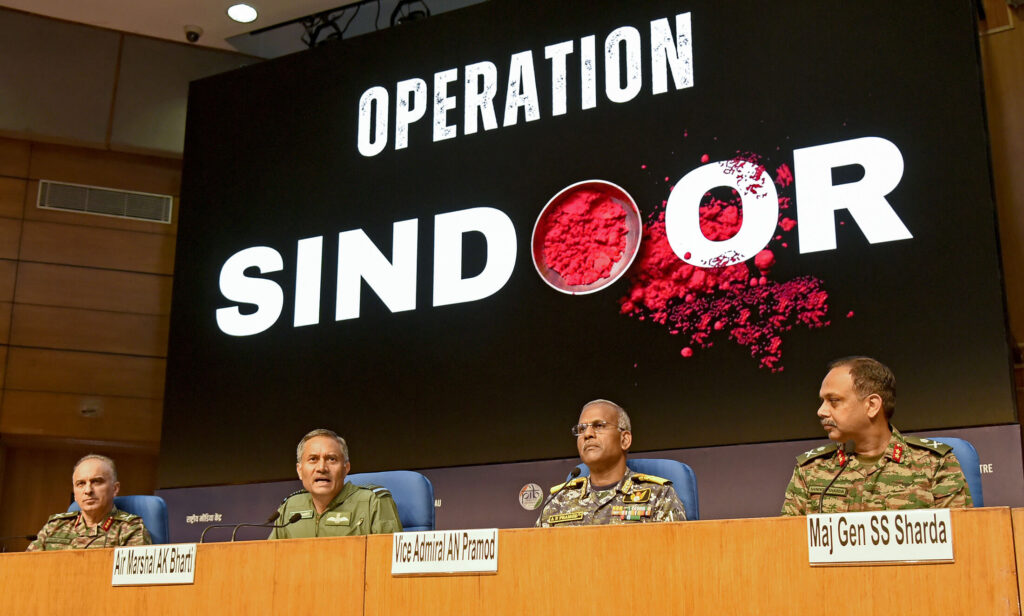
The appearance of Turkish drones and warships marks the emergence of a new external military actor in the India–Pakistan conflict zone. Turkey is not just helping Pakistan as its new friend— but embedding itself as a technological nerve centre, ideological amplifier, and co-strategist in the conflict.
By openly siding with Pakistan in the conflict against India, Turkey is projecting itself as the only Muslim power willing to militarily challenge India on Kashmir and defying NATO norms by getting involved in a South Asian conflict — while being a NATO member. By doing so Turkey is sending a bold message that it wants to reshape global Muslim alliances, and is willing to confront India militarily and ideologically to do so. This is not mere military support — Turkey is increasingly positioning itself as the leader of a new Islamic coalition, challenging the authority of traditional Arab powers like Saudi Arabia and the UAE.
Traditionally, India has faced a two-front threat from China in the north and Pakistan in the west. But now with Turkey’s entry of Turkish, can’t let its guard down and must adapt to Turkish-style unconventional warfare — using loitering drones, swarm tactics, and real-time battlefield intelligence.
The challenge for India is that while china provides strategic depth and platforms (jets, missiles, ships), Turkey delivers tactical agility — drones, cyberwarfare tools, and urban combat know-how. Together, these create a composite, hybrid threat that India’s conventional doctrines must rapidly adapt to.
This is a warning for India – the future of warfare on the western front may have Turkish footprints.

